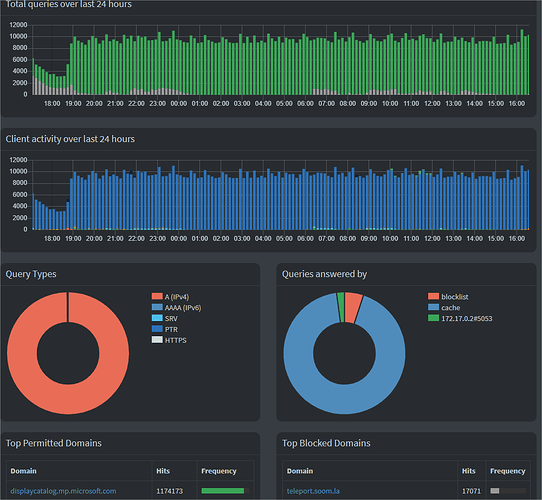Versions
- Pi-hole: v5.3.1 (Latest: v5.3.1)
- AdminLTE: v5.5 (Latest: v5.5)
- FTL: v5.8 (Latest: v5.8)
Platform
- OS and version: Debian GNU/Linux 10 (buster)
- Platform: Raspberry Pi 4 8Gb with Docker
Expected behavior
I don't want to have a saturation of hits on permitted domains.
Actual behavior / bug
After I installed the latest version of PiHole on my raspberry pi 4 8Gb with Docker, I have a weird behavior on the permitted domains.
I can see multiple call per seconds of this domain displaycatalog.mp.microsoft.com.
Initialy the call was initiate by my computer with the IP : 192.168.0.23 (but I don"t know why because I don't have open Windows Store) and after that it's look like a loop has started...
Steps to reproduce
Steps to reproduce the behavior:
- Go to the Dashboard
- Scroll down to : Top Permitted Domains
- See error
Screenshots
Additional context
A side of Pihole I have my own dns-over-https docker container that I referenced in pihole.
This is the script that I launch with supervisorctl :
$ cat pihole.sh
#!/bin/bash
# https://github.com/pi-hole/docker-pi-hole/blob/master/README.md
_term() {
echo "Caught SIGTERM signal!"
kill -TERM "$child"
}
trap _term SIGTERM
docker stop pihole || true
docker rm -f pihole || true
docker pull pihole/pihole:latest || true
eth0_ip=$(ip address show dev eth0 | grep -E -o "inet [0-9.]+" | grep -E -o "[0-9.]+")
echo $eth0_ip
docker run --rm\
--name pihole \
-e INTERFACE="eth0" \
--hostname=piholesrv \
-e TZ="Europe/Paris" \
-e ServerIP="${eth0_ip}" \
--shm-size=256m \
-e WEBPASSWORD="Ch4ngeMeP1ease!"\
-v "/opt/piholesrv/pihole/pihole/:/etc/pihole/" \
-v "/opt/piholesrv/pihole/dnsmasq.d/:/etc/dnsmasq.d/" \
-v "/opt/piholesrv/pihole/log/:/var/log/" \
-p 127.0.0.1:8080:80 \
-p 53:53/tcp \
-p 53:53/udp \
--ip 172.17.0.3 \
--cap-add NET_ADMIN \
--cap-add=SYS_NICE \
--dns=127.0.0.1 --dns=1.1.1.1 \
pihole/pihole:latest &
child=$!
wait "$child"
docker stop pihole
I have -p 127.0.0.1:8080:80 because I'm using Caddy as a reverse proxy in frontend.
Moreover, in the PiHole logs I can see multiple time those entries :
Apr 18 14:00:00 dnsmasq[513]: query[A] displaycatalog.mp.microsoft.com from 172.17.0.1
Apr 18 14:00:00 dnsmasq[513]: cached displaycatalog.mp.microsoft.com is <CNAME>
Apr 18 14:00:00 dnsmasq[513]: cached displaycatalog-rp.md.mp.microsoft.com.akadns.net is <CNAME>
Apr 18 14:00:00 dnsmasq[513]: cached displaycatalog-rp-europe.md.mp.microsoft.com.akadns.net is <CNAME>
Apr 18 14:00:00 dnsmasq[513]: cached consumerrp-displaycatalog-aks2eap-europe.md.mp.microsoft.com.akadns.net is <CNAME>
Apr 18 14:00:00 dnsmasq[513]: cached displaycatalog-europeeap.md.mp.microsoft.com.akadns.net is <CNAME>
Apr 18 14:00:00 dnsmasq[513]: cached db5eap.displaycatalog.md.mp.microsoft.com.akadns.net is 52.155.217.156
Apr 18 14:00:00 dnsmasq[513]: query[A] displaycatalog.mp.microsoft.com from 172.17.0.1
Apr 18 14:00:00 dnsmasq[513]: cached displaycatalog.mp.microsoft.com is <CNAME>
Apr 18 14:00:00 dnsmasq[513]: cached displaycatalog-rp.md.mp.microsoft.com.akadns.net is <CNAME>
Apr 18 14:00:00 dnsmasq[513]: cached displaycatalog-rp-europe.md.mp.microsoft.com.akadns.net is <CNAME>
Apr 18 14:00:00 dnsmasq[513]: cached consumerrp-displaycatalog-aks2eap-europe.md.mp.microsoft.com.akadns.net is <CNAME>
Apr 18 14:00:00 dnsmasq[513]: cached displaycatalog-europeeap.md.mp.microsoft.com.akadns.net is <CNAME>
Apr 18 14:00:00 dnsmasq[513]: cached db5eap.displaycatalog.md.mp.microsoft.com.akadns.net is 52.155.217.156
Apr 18 14:00:00 dnsmasq[513]: query[A] displaycatalog.mp.microsoft.com from 172.17.0.1
Apr 18 14:00:00 dnsmasq[513]: cached displaycatalog.mp.microsoft.com is <CNAME>
Apr 18 14:00:00 dnsmasq[513]: cached displaycatalog-rp.md.mp.microsoft.com.akadns.net is <CNAME>
Apr 18 14:00:00 dnsmasq[513]: cached displaycatalog-rp-europe.md.mp.microsoft.com.akadns.net is <CNAME>
Apr 18 14:00:00 dnsmasq[513]: cached consumerrp-displaycatalog-aks2eap-europe.md.mp.microsoft.com.akadns.net is <CNAME>
Apr 18 14:00:00 dnsmasq[513]: cached displaycatalog-europeeap.md.mp.microsoft.com.akadns.net is <CNAME>
Apr 18 14:00:00 dnsmasq[513]: cached db5eap.displaycatalog.md.mp.microsoft.com.akadns.net is 52.155.217.156
Apr 18 14:00:00 dnsmasq[513]: query[A] displaycatalog.mp.microsoft.com from 172.17.0.1
Apr 18 14:00:00 dnsmasq[513]: cached displaycatalog.mp.microsoft.com is (null)
Apr 18 14:00:00 dnsmasq[513]: config error is REFUSED
Apr 18 14:00:00 dnsmasq[513]: query[A] displaycatalog.mp.microsoft.com from 172.17.0.1
Apr 18 14:00:00 dnsmasq[513]: cached displaycatalog.mp.microsoft.com is (null)
Apr 18 14:00:00 dnsmasq[513]: config error is REFUSED
Apr 18 14:00:00 dnsmasq[513]: query[A] displaycatalog.mp.microsoft.com from 172.17.0.1
Apr 18 14:00:00 dnsmasq[513]: cached displaycatalog.mp.microsoft.com is (null)
Apr 18 14:00:00 dnsmasq[513]: config error is REFUSED
Apr 18 14:00:00 dnsmasq[513]: query[A] displaycatalog.mp.microsoft.com from 172.17.0.1
Apr 18 14:00:00 dnsmasq[513]: cached displaycatalog.mp.microsoft.com is (null)
Apr 18 14:00:00 dnsmasq[513]: config error is REFUSED
I think something is wrong somewhere...
What am I doing wrong ?
Thank you very much for your help.
Best regards,






